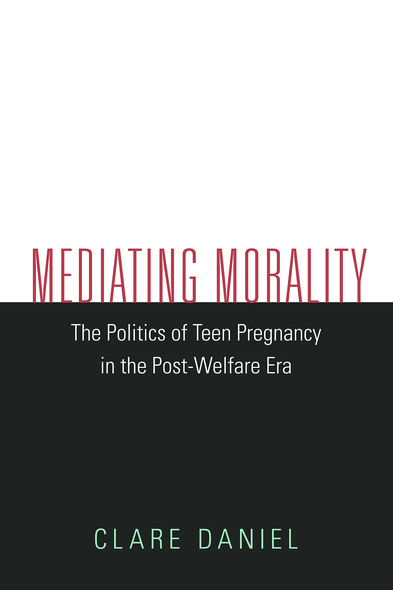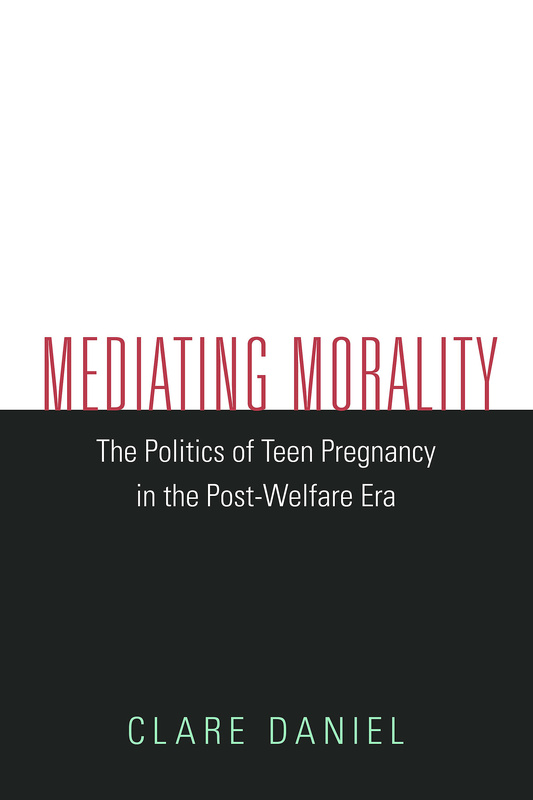Our shopping cart is currently down. To place an order, please contact our distributor, UTP Distribution, directly at utpbooks@utpress.utoronto.ca.
Mediating Morality
The Politics of Teen Pregnancy in the Post-Welfare Era
By Clare Daniel
University of Massachusetts Press
The approach the United States has taken to addressing teen pregnancy—a ubiquitous concern in teen education and perennial topic in popular culture—has changed dramatically over the past few decades. Specifically since the radical overhaul of welfare policy in 1996, Clare Daniel argues, teen pregnancy, previously regarded as a social problem requiring public solutions, is seen as an individual failure on the part of the teens involved.
Daniel investigates coordinated teen pregnancy prevention efforts within federal political discourse, along with public policy, popular culture, national advocacy, and local initiatives, revealing the evidence of this transformation. In the 1970s and 1980s, political leaders from both parties used teen pregnancy to strengthen their attacks on racialized impoverished communities. With a new welfare policy in 1996 that rhetoric moved toward blaming teen pregnancy—seemingly in a race- and class-neutral way—on the teens who engaged in sex prematurely and irresponsibly. Daniel effectively illustrates that the construction of teen pregnancy as an individual's problem has been a key component in a neoliberal agenda that frees the government from the responsibility of addressing systemic problems of poverty, lack of access to education, ongoing structural racism, and more.
Daniel investigates coordinated teen pregnancy prevention efforts within federal political discourse, along with public policy, popular culture, national advocacy, and local initiatives, revealing the evidence of this transformation. In the 1970s and 1980s, political leaders from both parties used teen pregnancy to strengthen their attacks on racialized impoverished communities. With a new welfare policy in 1996 that rhetoric moved toward blaming teen pregnancy—seemingly in a race- and class-neutral way—on the teens who engaged in sex prematurely and irresponsibly. Daniel effectively illustrates that the construction of teen pregnancy as an individual's problem has been a key component in a neoliberal agenda that frees the government from the responsibility of addressing systemic problems of poverty, lack of access to education, ongoing structural racism, and more.
Anyone who is doing research on teen pregnancy—from any perspective—should read this book, including people who might not usually engage in thinking about theories like intimate citizenship, biopolitics, and neoliberalism. Daniel writes about these topics in a very approachable fashion.'—Tasha N. Dubriwny, author of The Vulnerable Empowered Woman: Feminism, Postfeminism, and Women's Health
'Mediating Morality is lucidly written, meticulously researched, and thoughtfully constructed. It is an important contribution to scholars across disciplines working on women's reproduction, youth cultures, media studies, and contemporary neoliberal discourses. I also hope it falls into the hands of policymakers, social activists, and nonprofit leaders because it has the potential to change current framings of teen pregnancy and sex education.'—Karen Weingarten, author of Abortion in the American Imagination: Before Life and Choice, 1880–1940
'Daniel's close rhetorical analysis of public policies, political hearing tran-scripts, and pop culture texts makes an important intervention in current discussions of teen pregnancy prevention campaigns, identifying them as lying at the intersection of social reform rhetoric and popular culture.'—Journal of the History of Childhood & Youth
Clare Daniel is administrative assistant professor at Tulane University's Newcomb College Institute.





